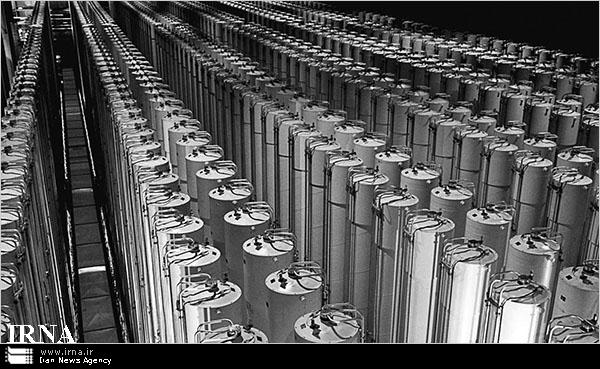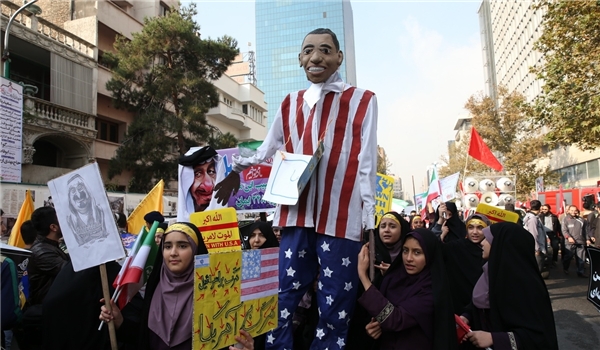PHOTO: Uranium enrichment centrifuges at Iran’s Natanz plant
LATEST
- “Analysts” on State TV Warn of “Sedition”, Step Up Anti-US Rhetoric
- Photo: Demonstrations Mark 1979 Embassy Takeover
- Crackdown on Journalists — 5 Arrested This Week
In a limited but notable step on Tuesday, the Rouhani Government pulled back — at least in its public statements — from Iran’s implementation of the July 14 nuclear deal with the 5+1 Powers.
On Monday, the head of the Atomic Energy Organization of Iran, Ali Akbar Salehi, said that Iran had begun taking its uranium enrichment centrifuges off-line, as required by the Joint Comprehensive Plan of Action.
However, an AEOI spokesman told reporters on Tuesday that Iran “has not reduced its number of centrifuges”. Behrouz Kamalvandi acknowledged the pressure of MPs over the issue, saying the AEOI is attentive to worries over implementation “before the realization of conditions” set by the Supreme Leader.
Under the JCPOA, Iran is to reduce its current stock of about 19,000 centrifuges to just over 5,000. In addition, Tehran is to send almost all of its enriched uranium out of the country or dilute it to levels far from the potential for a military program.
The Rouhani Government is seeking the fulfilment of the terms so sanctions can be lifted on Iran’s crippled economy. Implementation must be verified by the International Atomic Energy — a process that the Government hoped would be completed by mid-December — before US and European Union restrictions are removed.
However, the process is being hindered by hardline opposition and the Supreme Leader’s conditions on his endorsement of the JCPOA. Khamenei set out nine terms on October 21, including a public acknowledgement by President Obama and EU that the sanctions will be removed and will not be re-imposed.
Kamalvandi tried to balance the Government position and the Supreme Leader’s conditions on Tuesday, saying Khamenei’s “orders and considerations” will be the basis for Iran’s implementation while hoping that issues will be “resolved” by December 15.
The spokesman pointed to an advance on another of Supreme Leader’s conditions, a satisfactory agreement on the re-design of the Arak heavy-water reactor to reduce plutonium by-product:
With the exception of one country, the six member countries of the P5+1 have announced their positive opinion [of the document]. We are now expecting the announcement of this [remaining] country’s opinion sometime today or tomorrow, and the document will [then] be quickly signed.
MPs Maintain Pressure on Government
MPs continue to challenge the Government over the centrifuges on Tuesday.
Javad Karimi Ghodousi, a member of Parliament’s National Security Commission, said 200 centrifuges at the Fordow nuclear plant have been dismantled “so far”. He condemned the move, “Based on the Supreme Leader’s stipulations, Mr. Rouhani, Mr. Salehi, Mr. Kamalvandi, and [Deputy Foreign Minister Abbas] Araqchi have no right whatsoever to implement or make decisions about the Joint Comprehensive Plan of Action by themselves.”
Hamid Resaei, a long-time hardline critic of the Government, declared, “This game must end!”, even though he was told by an unnamed official that the Supreme Leader had “accepted” the removal of centrifuges. He said the Government’s move to “solve this issue” privately with the Supreme Leader was “unacceptable”.
“Analysts” on State TV Warn of “Sedition”, Step Up Anti-US Rhetoric
In another sign of the escalating tension inside Iran, State TV is featuring analysts who warn of “sedition” and denounce the US, to the point of accusing Washington of support Al Qa’eda.
Leading Iranian cultural analyst Hamidreza Moqaddamfar said in an interview on Tuesday night that the US is using the July 14 nuclear deal to undermine the Islamic Republic: “The [Iranian] officials should take infiltration serious and keep vigilance against it.”
Moqaddamfar said that, if the US “plot” was not taken seriously, it would be as great a danger to Iran as a military threat.
On Press TV, Tehran University academic Seyed Mohammad Marandi used a debate on “hostile US policies” to repeat the allegation of US subversion and to claim, among a list of evil American foreign policies, that the US is supporting the Al Qa’eda-linked Jabhat al-Nusra in Syria.
In contrast to Marandi’s remarks, US warplanes have bombed Jabhat al-Nusra positions since September 2014.
Photo: Demonstrations Mark 1979 Embassy Takeover
A march in Tehran on Wednesday, marking the 1979 takeover of the US Embassy:
Crackdown on Journalists — 5 Arrested This Week
Another journalist has been detained by Iran’s Revolutionary Guards, amid a crackdown and warnings of a “fourth sedition”.
The Guards’ Intelligence Unit seized Afarin Chitzadeh, a columnist for the newspaper Iran.
At least five journalists have been arrested this week, including prominent correspondent Isa Saharkhiz, a former Deputy Culture Minister who was imprisoned from 2009 to 2013, Ehsan Mazandarani, the head of the Farhikhtegan daily, and Saman Safarzaei, a member of the editorial board of the monthly publication Andisheh Pouya.
Lebanese-American businessman Nazar Zaka has also been detained, following the arrest last month of Iranian-American executive Siamak Namazi.
See Iran Feature: Iranian-American Businessman Namazi Reportedly Arrested
State broadcaster IRIB said on Tuesday that the Guards had “arrested members of an infiltration network in the media working for the enemy”.
On Monday, Guards head Mohammad Ali Jafari said Iran is facing a “fourth sedition” — following the 1980s Iran-Iraq War, the 1999 Tehran demonstrations, and mass protests in 2009 after the disputed Presidential election — and blamed officials “who trust liberalism and the West”.
See Iran Feature: Head of Revolutionary Guards Warns of “4th Sedition” & Attacks Government


